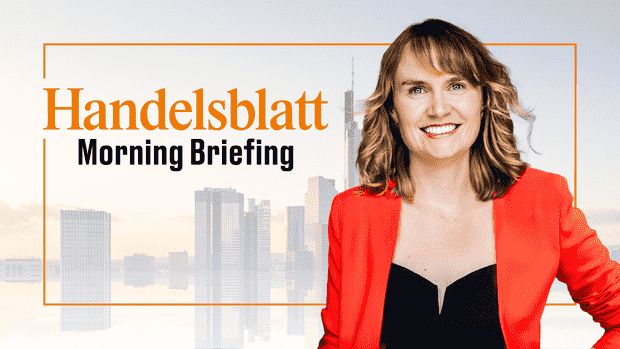Good morning dear readers,
Peter Thiel is many things at the same time: a prodigy of the technology scene and a right-wing libertarian ideologue. Also a celebrated businessman with a flair for new trends and a hated political activist with a penchant for dangerous theses. Precisely because of these contrasts, the PayPal founder and investor is incredibly difficult to grasp.
Our correspondent in New York, Felix Holtermann, tried to get closer to Peter Thiel and not only got hold of a rare interview with him, but also interviewed many of the controversial multi-billionaire’s companions.
This shows once again that the German-American is full of provocations, but above all full of contrasts. In an interview, for example, he praises the Greens, but wants to continue to support the Republicans in the USA. On the other hand, he does not want his remarks on right-wing activists during the interview to be published afterwards.
It seems that Thiel believes in one thing above all: progress through technology. Even his harshest critics have to admit that most of the time he had a good nose for the big new thing. Thiel now sees this type of disruptive innovation when it comes to artificial intelligence.
The “media hype” about it is justified, he says. Artificial intelligence can help against the current stagnation in innovation and productivity, everyone has now recognized that. Google, for example, is “completely in panic mode” because, according to Thiel’s prophecy: “We are currently experiencing something big because power is being redistributed.”
Peter Thiel: The tech investor is considered a pioneer, but is also controversial because of his political commitment.
As far as Germany, his parents’ home country, is concerned, Thiel makes some crude predictions, the probabilities of which are at this point open to question. Political escalations and provocative theses about the future are part of his repertoire. But here, too, Thiel’s inconsistency is revealed once again when, despite his gloomy forecasts, he states: “Germany is perhaps the country with the greatest gap between self-perception and potential.”
Read more about what is perhaps Silicon Valley’s most controversial figure in our big weekend title.
Stories in which courageous heroes fight alone against overwhelming injustice have their appeal. This is one of the reasons why the history of the investigation into the cum-ex scandal is so legendary. A public prosecutor who almost single-handedly uncovers the largest tax robbery in the history of the Federal Republic.
It becomes problematic when the lonely heroine does not get the support she needs in the further course of the story. This is what happened in the Cum-Ex case. The Cologne public prosecutor’s office, which is primarily responsible for investigating the fraud, is far from well staffed to deal with the flood of proceedings in good time.
As the Handelsblatt learned, the former North Rhine-Westphalian Minister of Justice Peter Biesenbach (CDU) has therefore filed a complaint against the head of the Cologne public prosecutor’s office. There is a risk of “frustration of prosecution in office”. Because in the worst case, individual investigations take so long that the accused could get away with lower penalties because of the long procedures.
The energy transition raises a big question: How can energy generated by the sun or wind in one place be consumed in another? One of the most promising solutions is to use hydrogen for storage and transport. But so far the necessary infrastructure is still missing.
However, soon a new pipeline for renewables is to be built in the North Sea, which will be called “Aquaductus”.. This could, for example, be used to transport hydrogen from Scottish offshore wind farms to the German coast.
The major goal is to create an entire hydrogen network in the North Sea through which green energy can be transported on a large scale. A study commissioned by one of the co-initiators of the new “Aquaductus” pipeline calculates that a 4,200-kilometer-long hydrogen network could be created in the North Sea with investments of between 15 and 22 billion euros. In this way, Germany, Belgium, Great Britain, Denmark and the Netherlands would be connected energetically.
For a long time there was a myth in Germany that business and politics always had to be viewed separately. The construction of the controversial Nord Stream 2 Baltic Sea pipeline, for example, was primarily justified by the fact that it was a “purely economic” project. The outcome of the whole thing is well known.
But in the past year, that perspective has changed. This is made clear by a cumbersome term that is currently being discussed in Berlin, but also in Brussels and Washington: outbound investment screening. This means that companies would be obliged to report certain investments in critical areas abroad to a government agency. In a second step, they could even be banned.
Discussions both at EU level and within the federal government are still in their infancy. But a Brussels insider told the Handelsblatt: “The instrument will come.” In the US, the debate is already more advanced. The measure would have a clear addressee there: companies planning to invest in China.
In the hours I’m writing the morning briefing, I get the sad news from Hamburg. According to police reports, shots were fired during an event organized by Jehovah’s Witnesses in the Alsterdorf district. According to the latest information, six or seven people died there and at least eight others were injured.
As there isn’t much more information available at the time this briefing goes to press, I don’t want to write more about it for the moment. You can find out more about the latest developments on the incident >> here. Against this background, however, a moody conclusion to the morning briefing, as is usual, does not seem appropriate.
I wish you a good start to the day anyway.
Best regards
Her
Teresa Stiens
Editor of the Handelsblatt


